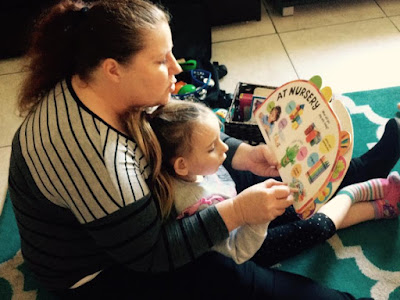When we began Emma's NACD neurodevelopmental program in July, I planned to blog once a month. Little did I know that with the demands of the program I would struggle find time to eat let alone sit down at the computer to write.
So...better late than never!
Emma is making progress but admittedly, at a slower pace than I would like. But I am also (slowly) learning to celebrate the 'little things' and find joy even in the darkest moments.
There is so much more to this 'program' than the work and learning. I feel like everyday I go into battle for Emma. It's not easy. It's not always fun. But the hope that we will 'win' this battle is what keeps us moving forward.
Emma's Progress
Significant improvements in muscle tone
Since beginning the deep pressure and movement exercises as part of her program Emma is no longer floppy AT ALL and noticeably stronger.
Significant improvements in motor planning / coordination / balance
Emma used to fall over constantly. She would walk into things, trip over things but not anymore! She now has good body awareness and is significantly more confident with climbing, playing on the playground and can now carry things without toppling over. She has started trying to stand on one leg and often tries to imitate dance moves she sees when watching music videos.
Just this week she jumped for the first time (using 2 feet) on the trampoline!
Improvements in receptive language
After feeling like she was never going to get it, Emma has begun processing 2 pieces of information. She is also able to recognize over 100 flashcards whereas before we started the program I was unsure of how many pictures / objects she recognized if any.
Improvements in auditory processing
We are finding Emma is responding more consistently to requests and is processing information quicker.
She hears everything without her hearing aids and often tells me if she 'hears' something by looking at me and putting her hands near her ears. This morning as we did our running she did this when she heard a dog bark in the distance. 6 months ago she wouldn't have been as 'tuned' in to hear the sounds around her.
Improvements in social Skills
After starting the GAPS diet in October we began noticing improvements in her social skills particularly her ability to interact with other kids. Adults are mostly kind and patient but generally young kids are not so it is very difficult for a child like Emma to engage in meaningful interactions with other kids. But now she is initiating social interactions and is able to 'maintain' interaction for a short period of time. She used to engage for 10 seconds and then wander off on her own but we are now noticing she is identifying kids her own age, approaching them and engaging happily in parallel play with the odd moment of co-operative play.
We also recently saw our first glimpse of 'compassion' where she realised she'd (accidentally) hurt another child and cried along with the hurt child before putting her arm around him as if to say 'sorry'. Gold.
All of these areas still need work but we celebrate her progress!
How I manage the program.....
We now have 3 amazing volunteers who come weekly to help with Emma in various ways depending on their experience and expertise. Their willingness to give of their time to help our family is actually what gives me strength on those dark days. These volunteers help remind me that even when the world seems harsh and unfair there is still goodness.
I admit we still struggle to get all the 'program' done 7 days a week. We are finding that as Emma moves through stages in her development she is becoming more like a 'toddler' and less like a 'baby'. This means meltdowns, tantrums and defiance and boy, is that girl stubborn. There are some days where it takes more like 3 hours to get program done.
We are praying that 2017 will be a year of continued growth and development for Emma but feel we need a miracle when it comes to her speech. So friends, I ask you to join us as a family in praying that our precious girl will find her voice in 2017 and we will be sure to give God the glory for his power at work in Emma's life.
Thank you from the bottom of my heart all for your kind words, prayers and encouragement in 2016. I am truly thankful.
Happy New Year everyone! xo

















